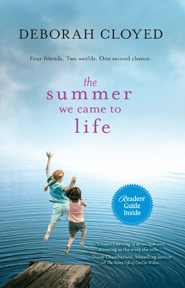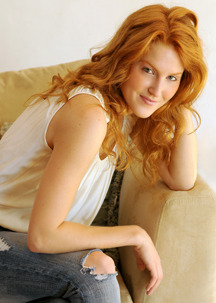

Deborah Cloyed's The Summer We Came to Life, out this month from Mira, is a surprising and ambitious debut novel that subverts expectations, ingeniously turning a resonant story of friendships rocked by a tragic accident into an even-more-resonant meditation on alternate realities and the nature of death. Cloyed is a seasoned traveler, a photographer, and a reality TV star thanks to a stint on The Amazing Race. I spoke to her recently about her inspirations for the novel, and how much of it is drawn from her own remarkable life.
You've had a couple of near-death experiences yourself -- can you describe them? Did the experiences change your perspective on religion? (Are you religious?) How did those experiences inform the novel?
I've had the unfortunate luck or destiny of nearly drowning twice. The first time was a white water rafting accident in the jungles of Honduras. The second was on vacation in El Salvador, in an occurrence more similar to the scene in the novel. Certainly, the experiences changed my perspective on spirituality. Really, they changed my perspective on everything. Science was always this giddy fascination for me -- all the big BIG ideas on multiple dimensions, black holes, time travel... I've loved physics like a kid loves Pop Rocks. I've never been specifically religious but equally fascinated by the fact that so many people are. When the drownings occurred, suddenly the big questions of physics hit much closer to home -- how do they bolster or contradict faith-based beliefs about death and dying and meaning in life? The longest running battle in history. Plus, it scared the crap out of me -- the wild child used to bungee-jumping off skyscrapers wearing a joker's grin. I got a full dose of what it means to snuff yourself out, leave behind a beach of screaming, terrified loved ones. In many ways, the accident was the impetus for the novel, a question in the middle of the night -- was I meant to die? What's out there? After? I kept looking at my best friends -- what would they have done? What would I do if I lost one of them?
Where does your interest in quantum physics come from? How much research, if any, did you do for the novel?
My obsession with quantum physics is born of the same curiosity that's taken me to two dozen countries and into countless precarious situations. I love that little thrill that comes in three parts: awe, fear, and humility. I get it from studying physics, off the map traveling, and observing nature in all its splendor and power. As for research, I suppose it took 15 years or two months, depending on how your look at it. Some agents and editors along the way weren't sure the physics belonged in 'women's fiction,' so I had to stick to my guns. It's my favorite part! I think it's also the heart of the novel that -- all these theories, both scientific and religious throughout the millennia -- still not one single human being knows for sure what really happens 'after.'
Your novel could be called "genre fiction" in the sense that it's got sci-fi and ghost elements. Do you worry about being labeled "chick lit"? Why do you think many male readers tend not give books about women a chance?
The whole 'genre' thing has been one of the most interesting lessons of being a debut author. In the early stages, one agent told me my problem was The Summer We Came to Life doesn't fit nicely into one genre. Men describe it as sci-fi if they're trying to sell it to their buddies, romance if they're being dismissive. Supernatural fans say supernatural. Harlequin says literary. My publicist keeps insisting it could also be YA. And of course, since it was written by a woman, it can't just be fiction. It has to be 'women's fiction.' I find all of this absolutely fascinating, and much more of a social commentary on our times than indelible. I've worked in the male-dominated photography industry for over a decade. I'm very much one of the boys. So it doesn't surprise me that this book -- with its focus on love and loss and family -- would be labeled 'women's fiction.' But then I'm curious what 'men's fiction' is -- car chases and strip clubs? For instance, why are Jonathan Franzen's books about aging mothers and crumbling family life not women's fiction? Because it's grittier, more perverse? More twenty-point vocabulary words? Such an interesting thing to think about! I hope that this dialogue will continue, because it exposes lingering sexism and stereotypes in our culture.
How similar was your own experience in Honduras to the Honduras of the novel? What made you set a novel there? How do you think your future novels will be influenced by your extensive travels?
I lived in Honduras for six months, and it was a magical time full of friendship, family, food, dancing, and music -- a very Latin way of life. This made it the perfect setting for a novel about love and life choices. The issues I was wrestling with at that time in my life -- turning thirty, growing up, meeting my parents as adults, considering both legacy and destiny, questions of faith and science -- are the same that we see the characters struggle with in different ways. My time in Honduras is forever linked in my memory to that stage in my life of figuring out who I was and what was next. It seemed natural to set the book there.
My next novel is a non-linear love story set against the backdrop of political violence in Kenya in 2007, where I lived after Honduras. Right after I left Nairobi, rage boiled over in the slums and across the city, and neighbors started killing each other with machetes. Ever since, I have been haunted by the question: how do people turn on each other so ferociously? Where is the line between good and evil in a person?
My travels influence my writing in tandem with the life stage I was in, the larger themes that plagued me then and long after.
You emphasize themes of female friendship, particularly the way it often takes precedence over romantic relationships. Do you feel like that's something you see among your friends?
Living in Los Angeles, it is very much a signature of what I see and experience. Women are hardly expected to get married young anymore, and in LA especially, I see this aversion to settling down in both sexes. One girlfriend describes it as a problem of "BBD" (bigger, better deal). The longer you're single, the more dating experience you have, the more the idea of 'the one' seems pretty farfetched. Seems like there's always someone smarter, more successful, better looking just around the corner. Therefore, in the decade between twenty and thirty, the real consistency in your life is provided by your girlfriends. They're the ones you eat dinner with, walk in the park with, do your Sunday grocery shopping with. They're the ones you lean on, support each other's careers, and tell your darkest secrets to -- all the things our parents shared as young honeymooners. This is a cultural phenomenon I was very intrigued by when I was writing the book.
Now, of course, things are a little different. I live with my boyfriend (who very much makes me believe in things like 'the one') and my childhood best friend. Love and loyalty is still very much alive in our society, but first women get the chance to really get to know themselves and form these deep friendships with other women.
How long have you been writing fiction? What was your path to publication? Advice for aspiring writers?
This is my first book, and it is the biggest thrill of my life, since I first won an award for a poem when I was five entitled "Sick, sick, sick."
Long time between age five and thirty-two. I guess I always knew I wanted to get out and live loud and see the world first, then get serious about the writing. Now that I pulled it off, it actually looks like a good plan. To family and friends, who watched me graduate with honors, then proceed to party my way across the globe with my camera, I doubt it looked plausible in the least. I met my agent in a wine bar in NYC, she sold the book to Mira after I moved back to LA. I just went and spoke to my old high school, and I found myself struggling to advise aspiring writers. I found myself falling back on adages. Do it before you're ready. Feed your mind. Finish what you start.
But if you want to know what's really worked for me, I would say -- smile. Talk to everyone. Ask lots of questions. Eavesdrop constantly. And write. Everyday.